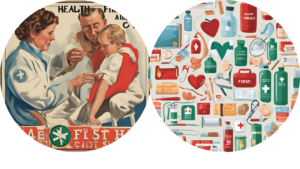Mental health is a critical component of overall well-being, yet it often doesn’t receive the attention it deserves. In today’s fast-paced, high-stress world, many people struggle with mental health issues such as anxiety, depression, and stress. Mental Health First Aid (MHFA) is an invaluable skill that can help individuals recognize and respond to mental health crises in a compassionate and effective manner. This article will explore what Mental Health First Aid is, its importance, how it works, and personal stories that illustrate its impact.
What is Mental Health First Aid?
Mental Health First Aid is a training program designed to equip individuals with the skills needed to provide initial support to someone experiencing a mental health crisis. Similar to physical first aid, MHFA aims to offer immediate assistance until professional help can be obtained or the crisis is resolved. The training covers a range of mental health conditions, including depression, anxiety, psychosis, and substance use disorders.

The Importance of Mental Health First Aid
Mental health crises can occur suddenly and without warning, affecting anyone regardless of age, gender, or background. Being equipped with MHFA skills can make a significant difference in the outcome of these crises. Here are a few reasons why MHFA is important:
- Early Intervention: MHFA can help identify signs and symptoms of mental health issues early, allowing for timely intervention and support.
- Reducing Stigma: By increasing awareness and understanding of mental health, MHFA helps to reduce the stigma associated with mental health conditions.
- Empowerment: MHFA empowers individuals to take action and provide support, fostering a sense of community and shared responsibility.
- Crisis Management: Knowing how to respond to a mental health crisis can prevent situations from escalating and ensure the person in crisis receives appropriate care.
How Mental Health First Aid Works
MHFA training typically involves a combination of lectures, group discussions, and role-playing exercises. The training is designed to be accessible to anyone, regardless of prior knowledge or experience in mental health. Here are the key components of MHFA:
- Recognizing the Signs: Participants learn to identify the signs and symptoms of common mental health conditions, such as changes in mood, behavior, and physical health.
- Approaching the Person: The training teaches how to approach someone in a non-judgmental and supportive manner, opening the door for conversation and support.
- Listening and Providing Support: Active listening is a crucial skill in MHFA. Participants learn to listen without judgment and offer reassurance and support.
- Encouraging Professional Help: MHFA emphasizes the importance of professional help. Participants learn how to encourage individuals to seek appropriate mental health services.
- Self-Care: The training also highlights the importance of self-care for those providing support, ensuring they maintain their own mental well-being.

Personal Stories: The Impact of Mental Health First Aid
Sarah’s Story:
Sarah, a high school teacher, had always been passionate about her students’ well-being. One day, she noticed that one of her students, Emily, had become increasingly withdrawn and was struggling with her schoolwork. Sarah had recently completed MHFA training and decided to use her new skills to help Emily.
“I approached Emily after class one day and simply asked if she was okay,” Sarah recalls. “At first, she was reluctant to talk, but I reassured her that I was there to listen without judgment. Slowly, she opened up about feeling overwhelmed and anxious about her grades and personal life.”
Using the techniques she learned in MHFA training, Sarah listened to Emily’s concerns and provided reassurance. She encouraged Emily to speak with the school counselor and even helped her set up the appointment. Over time, Emily’s mental health improved, and she expressed gratitude for Sarah’s support.
John’s Story:
John, a manager at a busy corporate office, had always prided himself on being a supportive leader. However, he felt unprepared when one of his employees, Mark, started exhibiting signs of severe stress and burnout. John decided to take an MHFA course to better understand how to support his team.
“During the training, I learned how to recognize the signs of mental health issues and how to approach conversations about mental health,” John says. “When I noticed Mark struggling, I invited him for a coffee and created a safe space for him to talk.”
Mark revealed that he was going through a tough time at home and felt overwhelmed by his workload. John listened empathetically and worked with Mark to adjust his responsibilities and connect him with the company’s Employee Assistance Program. Mark later shared that John’s support had been instrumental in helping him navigate his challenges.
The Broader Impact of Mental Health First Aid
Beyond individual stories, the broader impact of MHFA is significant. Communities that embrace MHFA training often see a decrease in mental health crises and an increase in community cohesion. Schools, workplaces, and organizations that implement MHFA programs foster environments where mental health is prioritized and stigma is reduced.
Schools and Universities:
Educational institutions that offer MHFA training to teachers, staff, and students create a supportive environment where mental health is openly discussed. This can lead to early intervention for students struggling with mental health issues and a reduction in bullying and absenteeism.
Workplaces:
Workplaces that invest in MHFA training for their employees promote a culture of well-being and support. Employees are more likely to feel valued and supported, leading to increased job satisfaction and productivity. Additionally, MHFA can help reduce workplace stress and prevent burnout.
Communities:
Communities that offer MHFA training to residents can build a network of support for individuals experiencing mental health crises. This collective effort can lead to improved mental health outcomes and a stronger sense of community.
How to Get Involved
If you’re interested in becoming a Mental Health First Aider, there are several steps you can take:
- Find a Training Course: Look for accredited MHFA training courses in your area. Many organizations offer both in-person and online training options.
- Spread Awareness: Encourage your workplace, school, or community to implement MHFA training programs. Raising awareness about the importance of MHFA can lead to a more supportive environment for everyone.
- Practice Self-Care: While it’s important to support others, don’t forget to take care of your own mental health. Regular self-care practices can help you maintain your well-being and be a more effective Mental Health First Aider.

Conclusion
Mental Health First Aid is a crucial skill that can make a significant difference in the lives of those experiencing mental health crises. By learning to recognize the signs, approach individuals with empathy, and provide initial support, we can help create a more compassionate and understanding society. Personal stories like those of Sarah and John illustrate the profound impact MHFA can have on individuals and communities.
In conclusion, investing in MHFA training is a powerful step towards promoting mental health awareness and support. Whether you’re a teacher, manager, parent, or community member, you can play a vital role in improving mental health outcomes and reducing the stigma associated with mental health conditions. Together, we can build a healthier, more resilient society where everyone feels supported and valued.




Your point of view caught my eye and was very interesting. Thanks. I have a question for you.
I don’t think the title of your article matches the content lol. Just kidding, mainly because I had some doubts after reading the article.
Thank you for your sharing. I am worried that I lack creative ideas. It is your article that makes me full of hope. Thank you. But, I have a question, can you help me?